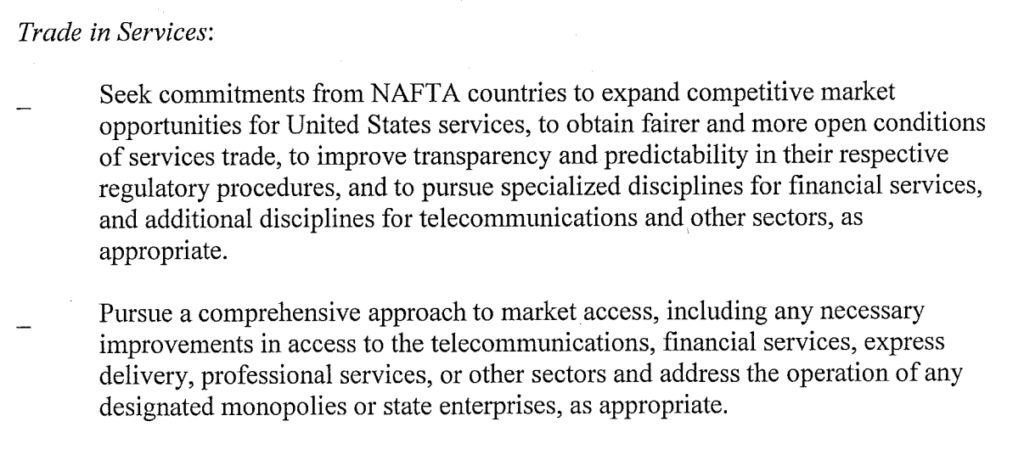Last week I posted on the leak of the draft notice from the Trump Administration on the NAFTA renegotiation, which identifies at least 40 issues, will serve as the starting point for discussions once talks begin. The post unpacked some of the general language to decipher what the U.S. has in mind on intellectual property issues. This second post examines some of the digital issues that U.S. officials have indicated will form a key part of the updated trade agreement.
Restrictions on Data Localization and Data Transfers

USTR notice http://www.bilaterals.org/?draft-nafta-notice
The core provisions in a future NAFTA e-commerce chapter will undoubtedly focus on rules requiring data localization and restricting data transfer. The TPP included a data localization provision which stated:
No Party shall require a covered person to use or locate computing facilities in that Party’s territory as a condition for conducting business in that territory.
The provision came in response to the emergence of data localization as an increasingly popular legal method for providing some additional assurances about the privacy protection for personal information. Although heavily criticized by those who fear that it harms the free flow of information, requirements that personal information be stored within the local jurisdiction is an unsurprising reaction to concerns about the lost privacy protections if the data is stored elsewhere. Data localization requirements are popping up around the world with European requirements in countries such as Germany, Russia, and Greece; Asian requirements in Taiwan, Vietnam, and Malaysia; Australian requirements for health records, and Latin America requirements in Brazil.
Canada has not been immune to the rules either with both British Columbia and Nova Scotia creating localization requirements for government data. Moreover, the federal government’s 2016 cloud computing strategy prioritizes privacy and security concerns by mandating that certain data be stored in Canada. In response, leading technology companies such as Microsoft, Amazon, and Google have established or committed to establish Canadian-based computer server facilities that can offer localization of information. The U.S. will use NAFTA to restrict the use of data localization requirements.
The draft notice also cites restrictions on data transfers. As I noted in a recent column, those rules are important to preserve online freedoms in countries that have a history of cracking down on Internet speech, but in the Canadian context, could restrict the ability to establish privacy safeguards. In fact, should the European Union mandate data transfer restrictions as many experts expect, Canada could find itself between a proverbial privacy rock and a hard place, with the EU requiring restrictions and NAFTA prohibiting them.
Trade in Services

USTR notice http://www.bilaterals.org/?draft-nafta-notice
The trade in services issues could focus on several issues. First, the reference to telecommunications suggests that any lingering restrictions – including investment restrictions – could face pressure under the NAFTA renegotiation. Second, the TPP included provisions with implications for sharing services such as Uber and online gambling. Both could be up for review as part of the NAFTA talks.
Regulatory Transparency

USTR notice http://www.bilaterals.org/?draft-nafta-notice
Regulatory transparency seems like an uncontentious issue, yet the TPP provisions on transparency ventured into issues such as medical device approval and the prospect of a pharmacare program. For example, Annex 8-C 7bis of the TPP required each party to makes its determination on whether to grant marketing authorization for a specific pharmaceutical product on the basis on factors such as clinical data, manufacturing quality, and labelling information. However, it also states that:
no Party shall require sale or related financial data concerning the marketing of the product as part of such a determination. Further, each Party shall endeavour not to require pricing data as part of the determination
Annex 8-E for the approval of marketing of medical devices was similar:
no Party shall require sale, pricing, or related financial data concerning the marketing of the product as part of such a determination
The TPP also included detailed provisions on the creation of a national pharmacare program (including the possibility of creating one in the future), all under the guise of transparency.








Pingback: Digital Rights Issues Bubble Beneath NAFTA Re-Negotiations Talks
Even if a US company builds a data center in Canada, the US can hand them a Security Letter ordering them to send all the information in that data center to the US, even if that would violate Canadian law.
We should also keep in mind that from the Snowdon leaks the US government paid for intercept equipment to be put into all of the 5 Eyes countries that sends all that information first to the US and then it is forwarded onto Israel.
We need to worry about what is already happening, not just what might be coming in the future. Probably no country has had less discussion about the spying the government does on it’s citizens than Canada.
As the US government regularly states it is not bound by international or domesic law or by treaties I am in no rush for the Canadian government to enter into a new agreement with the US. As painful as it would be in the short term I think we would be far better off if NAFTA was repealed. We currently run trade deficits with the US and what we do send has a high percentage of unfinished resources where as what the US sends us is mostly finished goods. We did just fine with out NAFTA before and can do it again.